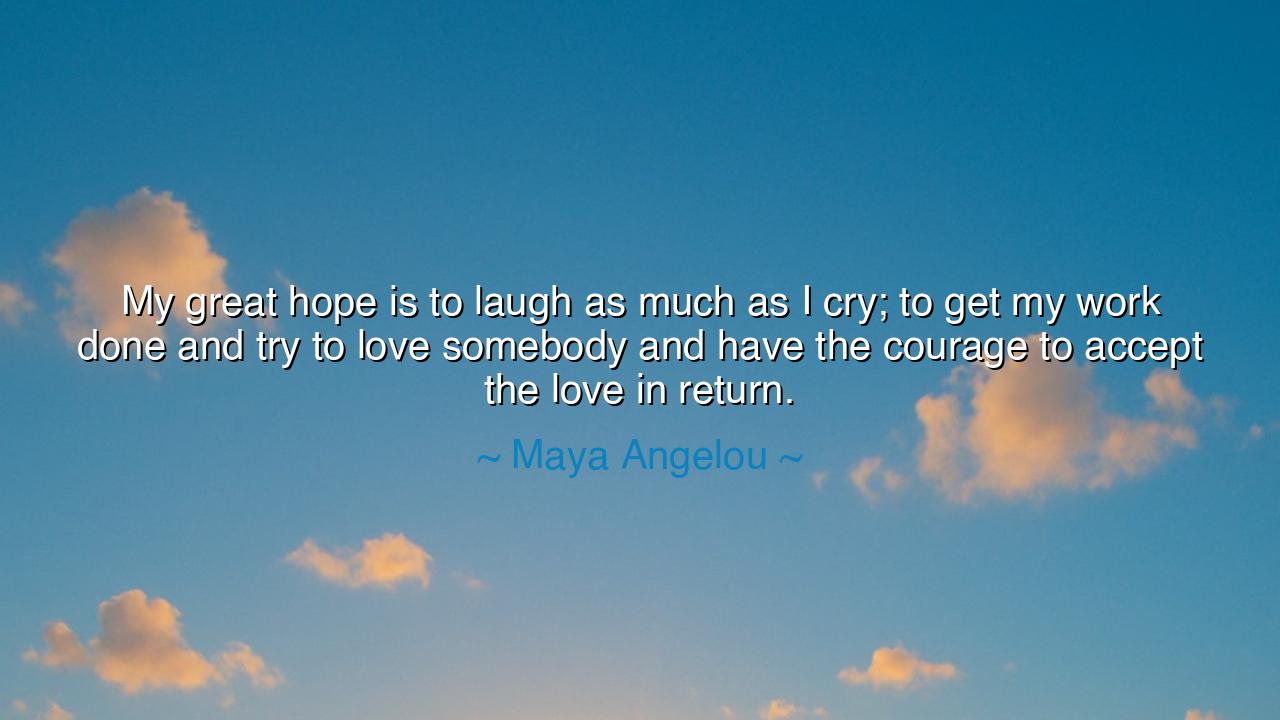
My great hope is to laugh as much as I cry; to get my work done
My great hope is to laugh as much as I cry; to get my work done and try to love somebody and have the courage to accept the love in return.






“My great hope is to laugh as much as I cry; to get my work done and try to love somebody and have the courage to accept the love in return.” — Thus spoke Maya Angelou, the poet of the human heart, whose words flow like rivers through the deserts of despair. In these simple yet profound lines, she offers a creed for living — a sacred balance between joy and sorrow, labor and rest, giving and receiving. Her words are not the hollow musings of comfort, but the wisdom of one who walked through fire and still chose tenderness. They teach us that to be fully human is to embrace both laughter and tears, to labor with purpose, and above all, to love — bravely, openly, and without shame.
Angelou’s hope was not naive; it was forged in pain. Born into a world of injustice and cruelty, she saw how suffering can harden the heart, how grief can turn the spirit inward. But she also knew that the soul, if it is to remain whole, must laugh as much as it cries. Laughter, for her, was not denial but defiance — the act of reclaiming joy from the jaws of despair. To laugh, even after one has wept, is to declare that life is still worth living. To cry, even when one is strong, is to honor the depth of one’s being. The noble heart, she teaches, is one that allows both — for neither joy nor sorrow alone can make a complete human being.
Then comes the second commandment of her wisdom: to get my work done. For Angelou, work was not mere labor, but the expression of the soul’s purpose. It is through work — honest, patient, and steadfast — that one leaves footprints upon the sands of time. She understood that laughter and tears, though divine, must find their fulfillment in creation. The one who does their work with love turns the dust of existence into meaning. Whether one is a poet, a teacher, a builder, or a parent — the task is the same: to give one’s best to the world before night falls. Work, in Angelou’s vision, is prayer made visible.
But her teaching does not end there. She dares to speak of love, that most perilous of gifts. “To try to love somebody,” she says — and in that word try lies infinite humility. For love is not conquered, it is attempted. It requires patience, forgiveness, and vulnerability. Love is the quiet heroism of the heart that chooses connection over safety, tenderness over fear. And yet, even harder than loving is what she names next — the courage to accept love in return. So many souls can give, but few can receive without shame, without suspicion, without the armor of pride. To accept love is to admit that we are worthy of it — that despite our scars, we deserve to be seen and cherished.
Consider the life of Nelson Mandela, who after twenty-seven years in prison, emerged not with vengeance but with compassion. He had suffered as much as any man, yet his laughter was deep and full, his work tireless, his love for humanity unbroken. And when the world offered him love — when millions hailed him as a symbol of hope — he accepted it, not with arrogance, but with grace. He embodied the very rhythm Angelou spoke of: the tears of endurance, the laughter of freedom, the labor of justice, and the courage to both give and receive love. Such a life is not perfect, but whole.
The origin of Angelou’s words lies in her own story — a journey from silence to song. As a child, wounded by violence, she stopped speaking for years, believing her voice could cause harm. Yet later, that same voice rose to inspire generations. Through her art and her life, she discovered that pain does not destroy; it refines. Her laughter was hard-won, her love deliberate, her work the vessel through which her spirit found peace. She learned, and now teaches, that the fullness of existence is not in escaping pain, but in transforming it into wisdom.
The lesson, dear listener, is as simple as it is eternal: live completely. Laugh when joy visits you, and cry when sorrow demands it — do not flee either. Work not only for gain, but to leave a trace of your spirit upon the world. And above all, love — not timidly, but with the courage to be known. To love and to be loved is the final act of creation, the highest form of human bravery.
So, as you walk through your days, let Angelou’s words be your compass. Balance your laughter with your tears, your effort with your rest. Do your work with honesty, and keep your heart open to love, even when it frightens you. For life’s greatest art is not in perfection, but in wholeness — in living every emotion, completing every task, and giving and receiving love without fear. In this, you will find not only meaning, but the quiet, radiant joy of being truly alive.






AAdministratorAdministrator
Welcome, honored guests. Please leave a comment, we will respond soon